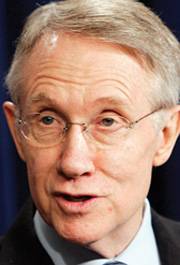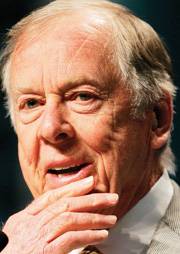Monday, Aug. 10, 2009 | 2 a.m.

Sen. Harry Reid wants tax incentives for conversion of natural gas to vehicle fuel.

Oil and gas tycoon, Pickens', plan for massive wind farms has been put on hold.
Sun Archives
Sun Coverage
Beyond the Sun
In remarks to the media setting the stage for today’s National Clean Energy Summit in Las Vegas, Sen. Harry Reid spent a good deal of time voicing support for tax incentives to convert natural gas to fuel.
The idea came from natural gas entrepreneur T. Boone Pickens, and Reid described himself as “an absolute convert” to the idea.
It was an unexpected introduction to Reid’s second annual star-studded gathering of people interested in promoting clean energy, which runs today and Tuesday at Cox Pavilion on the UNLV campus. The Senate majority leader has been a champion of renewable energy — and natural gas is not a renewable resource. Neither is natural gas extraction a big industry in Nevada.
But natural gas is considered cleaner than coal and oil. And advocates of clean energy say that although wind, solar and geothermal are still the ultimate goal, natural gas can serve as a bridge resource that can reduce carbon emissions while the nation develops those renewable resources.
Last year, the two top needs identified by those at the summit were a long-term extension of tax incentives for renewable energy production and more transmission lines for renewable energy.
Congress approved the tax incentives a few months later as part of the bailout of financial institutions. Transforming the grid and other key suggestions were addressed in the economic stimulus bill, and others are included in the climate and energy bill, which was passed by the House in June but is held up in the Senate.
But the movement toward renewables was slowed over the year by a powerful counter-force: the crash of credit markets. That crash, combined with logistical challenges, has led to slower development of renewable energy than anticipated last year, conference participants said in interviews last week.
As development of renewables sputtered, natural gas gained some momentum as prices dropped 70 percent. Prices are expected to stay low as producers have discovered vast new supplies through new technology that allowed them to drill through dense rock.
Pickens, who built his fortune on natural gas, is an example of the changing energy landscape. Last year he introduced a plan to have cars run on natural gas converted to fuel, and to build wind farms and other renewable energy plants. But last month, he announced he was postponing plans for the largest U.S. wind farms because of difficulty accessing credit and connecting to transmission lines.
With Pickens’ involvement, Reid introduced legislation last month separate from the energy bill to create tax breaks for buying natural-gas-fueled vehicles.
In a speech last month to the Colorado Oil and Gas Association, former Sen. Timothy Wirth told the natural gas industry it “has more to gain, and a greater contribution to make, than any other industry in America or, for that matter, in the world.”
Wirth, the president of the United Nations Foundation, is expected to make similar points at the Summit this year.
But Dave Hamilton, the Sierra Club’s director of global warming and energy programs, called natural gas “cleaner but not clean.” Natural gas produces 50 percent less carbon emissions than coal. Carbon emissions are widely viewed to be a major cause of global warming.
Yet Hamilton said he is not concerned that interest in natural gas will stall renewable energy or energy efficiency efforts. “I think the futures are intertwined,” Hamilton said.
The logistical hurdles facing renewable energy include obtaining the myriad approvals necessary to build transmission lines across federal lands in the Nevada desert and finding a way to store sun and wind energy for use when the sun doesn’t shine and the winds don’t blow.
In Nevada, several solar projects with the ability to store energy are in development.
NV Energy CEO Michael Yackira said he sees solving the storage issue as the most important component in developing renewable energy for the state.
He also noted that cheaper natural gas makes renewable energy more expensive in comparison, but he doesn’t believe the price of natural gas alone is reason enough to begin relying on it more for energy.
“We have so much natural gas in our system that adding natural gas would only be done for purposes of reliability, not for any other reason,” Yackira said.
Despite Reid’s recent remarks, natural gas is not expected to be a big feature at the conference, said Daniel Weiss, a conference organizer for the Center for American Progress’ Action Fund, an advocacy group. Weiss said he invited several natural gas executives to participate, but none could make it.
Instead, Weiss expects energy efficiency to be a focus, along with policies to make the United States a leader in renewable energy technologies, with emphasis on creating jobs.
The Center for American Progress, a liberal think tank, is to release a report today promoting retrofitting existing buildings and households to make them more energy efficient.
Regardless of the ideas arising from this year’s summit, one thing is clear: The participants have more clout than they did last year.
Many of last year’s participants were given top jobs in the Obama administration. Nobel Prize-winning scientist Steven Chu told attendees last year that government could spur clean energy development by providing funding for research to bring down the cost of photovoltaic solar cells, encourage biomass to replace jet fuel, and spur other important developments.
At the time, Chu was director of Lawrence Berkeley Laboratory. He is now Energy secretary and has started to dole out $38.7 billion in federal economic stimulus money for energy.
Hilda Solis, who attended last year’s summit as a U.S. representative from California, returns as the Labor secretary.
Van Jones, who operated a nonprofit promoting green jobs, will come back as President Obama’s green jobs adviser.
“Now they have the power to do something,” said Marc Porat, a building materials entrepreneur and investor who will speak at the conference. “This is a group that wants to transform America and turn it into a clean economy, and no one before had the vision and the mandate to go do that.”
And, of course, the summit will feature such energy and environment heavyweights as former president Bill Clinton and former Vice President and Nobel Prize winner Al Gore. It will be the second meeting in a week of two men who have rarely appeared together publicly in the nine years since they served in office.

Join the Discussion:
Check this out for a full explanation of our conversion to the LiveFyre commenting system and instructions on how to sign up for an account.
Full comments policy